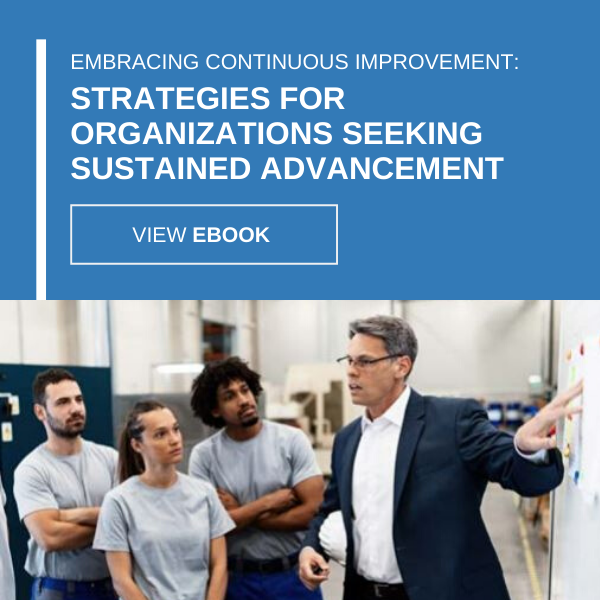
Good Training Can Help Middle Management be Top Achievers
While competitive salary and benefits are great incentives for workers to achieve and perform at their best, they want something more than good compensation. Employees also desire growth. And one of the best ways to reward particularly impressive personnel is by appointing them to middle-level management — a substantial rung on the journey up the corporate ladder.
Middle managers are aptly named, not only are they at the midpoint of the leadership hierarchy, but they also serve as the intermediary between the staff and senior executives. In many ways, they’re the glue that unites the various personnel components of a business.
At the same time, though, there’s nothing mid-level about middle management when it comes to responsibility. It’s about as pressure-filled as it gets because these leaders have numerous duties that they’re ultimately in charge of seeing through to fruition. The list of obligations is voluminous, including client relations, accounts receivable, administration of day-to-day routines, monitoring performance, and dealing with the various questions and concerns from the people they supervise. In short, mid-level management is not for rookies, nor is it something you can drop someone into and hope for the best.
Pivotal to their success is middle management training. The following details various ideas and strategies you can use to turn mid-level managers into high-achievement leaders.
Get them involved ASAP
Effective mid-level management is not something that can be effectively taught by reviewing a textbook or tutorial. Like a muscle, it has to be worked on consistently in order to grow and get better. As such, it’s important to provide learning experiences for mid-level managers so that they can hit the ground running.
“An experiential approach to middle management training can help them learn from experience.”
In some ways, mid-level management is akin to student teaching. People in this position may come into it with certain ideas about how to run things in various scenarios, but it isn’t until they actually get their feet wet that their assumptions are challenged and mettle tested. In short, an experiential approach to middle management training can help them learn from experience by putting them in decision-making roles right away. These situations can be reflected on in one-on-one meetings at the end of the week to go over how things went and provide constructive feedback for what went right, what went wrong, and what to do next time.
Draw on others’ experience
No matter how long you’ve been in business, you probably employ individuals who have been in middle management positions in the past. These people can be fantastic repositories for information regarding what they took away from the experience. You may want to ask them about what they wish they’d known before they become mid-level staff or a single piece of advice that they’d give a budding mid-level manager. Collecting as many opinions as possible can provide greater clarity and identify certain similarities that may be helpful to relay to the people you’re training.
Stress the importance of relationship building
Of course, everyone knows that they have a job to do when they come into the office or warehouse. But there’s a big difference between getting a job done, and getting it done well. Much of this depends on employees truly desiring to achieve more and be better. This can develop over time by mid-level managers establishing a good rapport with the people they supervise.
According to polling conducted by the Society for Human Resources Management, close to 60% of respondents said the relationship they maintained with their immediate supervisor was “very important.” However, only 40% indicated that they were “very satisfied” with the state of said relationship.
“Nearly 50% of individuals have left a job primarily due to a boss that they didn’t like.”
When personnel are on very good terms with mid-level managers, they may be more inclined to strive for success because they feel as though they’re a part of the team and seek to impress, thus increasing engagement as well as retention. A survey conducted by specialized staffing firm Robert Half found that nearly 50% of individuals have left a job for a different position primarily due to a boss that they didn’t like.
Middle management trainees can plant the seeds for developing stronger bonds by taking a genuine interest in their supervisees’ lives outside of the warehouse, such as their likes and dislikes or what they enjoy doing in terms of hobbies, activities, or just to unwind. This can also help build the camaraderie needed to reduce employee turnover.
Attend middle management training workshops
Human resource groups, staffing firms, and research organizations frequently hold seminars that offer interesting insights on how mid-level managers can become better in their day-to-day dealings. Surveys and polls may be presented that provide context into trends and why a different approach to employee or shop floor management is worthwhile. You may want to encourage trainees to attend these throughout the year to enhance ongoing learning.
Be considerate of employees’ contributions
Regardless of the working environment, stress is almost a given. Things need to get done and there’s only so much time to complete them. Burnout can result. In fact, based on a poll conducted by Accountemps, over 90% of workers attested to experiencing burnout on at least a somewhat regular basis.
Much of this can be allayed, however, by recognizing workers for all their hard work. Whether this is by talking to them one-on-one, sending a thank you note, or calling out particularly good work they did in a company-wide email, workers appreciate being appreciated, which can serve as the energy they need to dig a little deeper and realize that hard work truly does pay off. Mid-level managers should aim to be as congratulatory as possible to be an effective and inspirational leader.
While it’s true that hard work pays dividends, it’s not necessarily about working harder but working smarter. At USC Consulting Group, we empower performance working side-by-side with you and your staff in order to better understand the situation you’re in and what can be done to turn weaknesses into strengths and problems into solutions. Whether that’s by implementing process improvements or offering tips on what to look for in order to put the right leadership pieces in place, we can help you reach your potential through scoping, analysis, design, and implementation.







